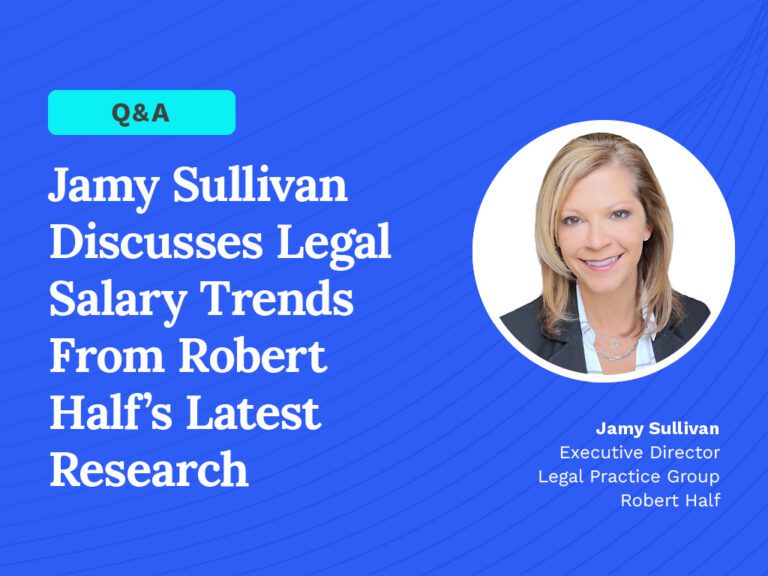Jamy Sullivan Discusses Legal Salary Trends From Robert Half’s Latest Research
September 29, 2025

Jamy Sullivan is Executive Director of the Legal Practice at talent solutions and business consulting firm Robert Half. Based in Dallas, she has held various management positions within the company. Sullivan is also an author and speaker on legal employment and practice management topics.
Legal salaries are expected to grow 1.4% in the coming year, with employers willing to pay a premium for certain specialized skills in areas such as legal technology integration and automation, AI governance, and data privacy.
That is just one of the key takeaways to emerge from the Robert Half 2026 Salary Guide’s breakout report on the legal industry. The guide, which is now live on the talent solutions and business consulting firm’s website, compiles salary benchmarks, survey results, and other data sources to provide a comprehensive overview of market trends in compensation and hiring across the legal industry. It features granular salary data by United States city as well as role-specific information for both in-house and law firm positions.
Across the board, perks and benefits, including hybrid work options, are an important part of the overall compensation picture, as Jamy Sullivan, Executive Director of the Legal Practice at Robert Half, explained in an exclusive interview with Today’s General Counsel.
“That is one of the themes that we see coming out of the salary guide this year, making sure that companies are looking at the total compensation that they’re offering. That is what really can help you attract the right talent and retain your talent,” she said. “And what new benefits or perks can you offer— in addition to that uptick in salary— is becoming really premium for candidates.”
The full Q&A is below.
The legal report shows that legal salaries are expected to grow 1.4% year-over-year in 2026—obviously, there will be variations by geographic markets. How does that growth compare with what we’ve seen in past years? And how would you also just generally characterize the overall market climate for legal?
Jamy Sullivan: Yes. As you said, 1.4% is what we’re seeing for the coming year, for 2026, for legal. It’s pretty comparable with what we’re seeing across the board for other industries. The growth for the 12-month prior period was a little bit higher at 3.6%, but that number was a little inflated with all of the hiring that took place at companies in the previous years, adding staff and recalibrating what their infrastructure was going to look like. Seeing a year-over-year growth of 1.4% seems in line with other years.
We continue to see even higher salary increases year-over-year for more specialized skills within legal. To be more specific, salaries for contract manager roles are actually up 2.7% year-over-year. Salaries for compliance roles are 2.1% year-over-year, and really across the board, associate attorney law firm demand is up 1.5%. There are other specialized areas that are outpacing the 1.4% growth for the whole sector.
According to the research, 79% of legal leaders typically offer higher salaries to candidates with specialized skills in areas like legal technology integration and automation, AI governance, data privacy, data analytics, compliance, and risk management. What resources or training should job candidates be seeking out to make themselves as competitive as possible?
Jamy Sullivan: Love that. We hear a lot about this one. First, if they are currently employed, job seekers should start by looking internally. Many employers are taking the time to upskill their current staff to retain them. Second, what opportunities are there internally with your organization to upskill? Whether it’s because your firm or organization is investing in a new legal technology program, or they’re exploring how to integrate AI, they’re clearly going to look at ways to properly upskill their staff. From an external standpoint, you can find online programs that are free out there to get you upskilled, like Microsoft 365 Copilot.
Thirdly, go to local conferences. They can be virtual, they can be in person, and you can absolutely have an opportunity to upskill yourself. Talk with other colleagues in the market on what demand they are seeing, what they are being asked to upskill themselves on, or get familiar with. What is their company or their firm invested in?
Talking about the different practice areas, the report mentions that the hottest practice areas include ethics and corporate governance, labor and employment law, litigation and privacy, data security and information law. Why are these areas in such strong demand right now?
Jamy Sullivan: With the current landscape of complex regulatory changes in the legal realm, there are compliance changes, obviously, that are going to go along with that. There are policy changes. To be able to keep up with that, understanding where your data is from the information law and data privacy standpoint is so important. It’s just constantly changing right now. That’s why they need to stay ahead, to stay informed on how your company or your firm clients might be impacted by such a hot ticket item right now.
Hiring for labor and employment law has maintained a steady pace since COVID. State laws on employment and labor are changing on a regular basis. That’s another reason companies are investing in candidates in those areas, because they have to stay ahead of state and federal law and be in compliance. And as we go through market and policy changes, as I mentioned on the front end, litigation is just countercyclical. That’s why it usually rises to the top as a hot practice area and a busy practice area.
Talking about benefits and perks, what are some things that employers should keep in mind on those packages? What should they be doing to attract the best talent?
Jamy Sullivan: The two leading factors that are coming to the top, that candidates are mentioning are the most important to them are the financial incentives and then secondly, work-life balance. Those are both equally weighted at 52% in our report. So, for an effective recruiting strategy, how are you, as a legal manager, looking at those two things and implementing them into your total package?
Particularly in the law firm world, how do you look at your bonus packages? How are you compensating your associates at different levels through bonuses for the summer and the end of the year? What does that look like so that you can retain and attract new talent?
The work-life balance piece? We still see flexible scheduling, or at least one day remote is still common in the market—100% remote is not as common—but that is a huge differentiator that candidates are still looking for. Our research shows that 60% of candidates said they would work on-site full-time if the salary were higher. But ideally, they would like at least one day of remote work. So it’s like there’s a give and take. If you’re not able to offer that remote option or flexibility, then you definitely have to be willing to compensate the salary in a higher way.
That was going to be one of my next questions on remote and hybrid work, because I see that you’re highlighting a bit of a work flexibility gap between job seeker expectations and what employers are actually offering. Your research says that 70% of job seekers want a hybrid option, but only 25% of companies are actually offering that hybrid work setup. So, it’s interesting to see how that’s going to evolve.
Jamy Sullivan: We continue to hear, particularly in the law firm world, that more and more firms are going back on-site a minimum of four days a week, some are fully on-site. That also depends on the role. It’s different for a legal support role, or a paralegal role, compared with an attorney role. That’s my advice: if hybrid isn’t something that you’re able to offer, be upfront and honest about that from the get-go.
So let’s talk about offer negotiations for a minute. Your research says that some 93% of legal professionals say they feel confident negotiating a salary offer. Meanwhile, 77% of legal leaders worry about keeping pace with candidates’ compensation expectations through 2026. So how do you see these conversations evolving for both sides?
Jamy Sullivan: From a job seeker’s perspective, you have the opportunity to do your homework in the market and know what other competitors are paying, so that you can walk into that interview confidently and know your skill set. If you have a specialized premium skill set, be able to bring that to the table. 79% of legal managers are willing to pay more for specialized skills. So walk in being able to articulate that and explain how you put it into practice. How has it helped your organization increase revenue, save money, or impact the bottom line? What was the return on investment from your specialized skill to that organization? Articulating that will give you a bargaining chip for negotiating, investing in skill development, and upskilling.
Talk to them about your willingness to give and take on remote flexibility or the financial incentives that you’re looking for. Just come prepared to know your total package and what would make you sign today for that offer.
On the employer side, it’s really sitting down and looking at the budget and how things can be changed from a perks and benefits standpoint to ensure that you’re attracting talent. How can you articulate that? If you can’t do the financial investments or the work-life balance, then make sure that your health and wellness offerings are there, because that’s also an important perk that candidates are looking for. What does the retirement planning look like? On 401Ks, what is your matching or investment there?
Also, what other opportunities are you as an organization offering them to learn or do new things, like be part of a task force that’s implementing AI? Candidates are extremely interested in that. If you’re able to mention that when you’re talking with candidates, that’s a great way to get them attracted to come in and work with you. This comes up in all of my interviews, but having a mentorship-type program is really important in this day and age, with more junior candidates coming into the market.
Must read intelligence for general counsel
Subscribe to the Daily Updates newsletter to be at the forefront of best practices and the latest legal news.
Daily Updates
Sign up for our free daily newsletter for the latest news and business legal developments.




